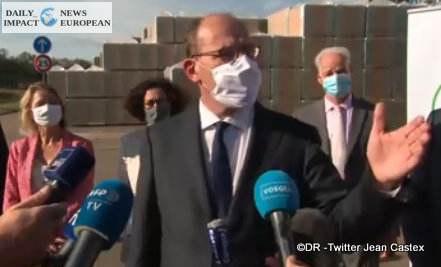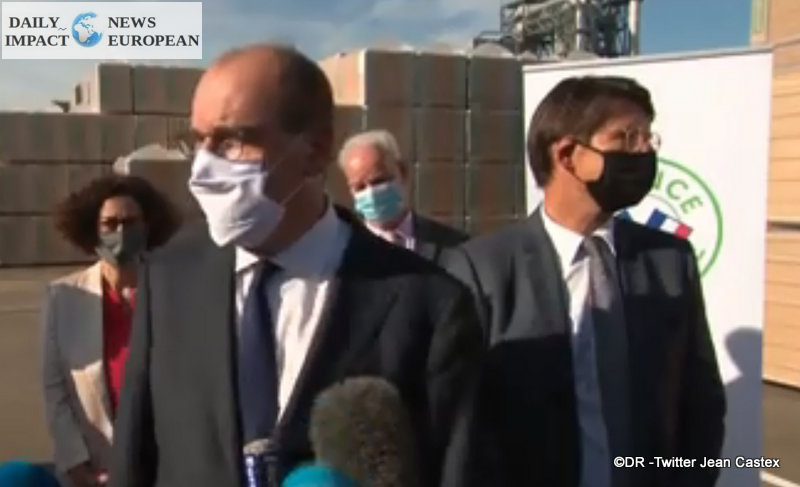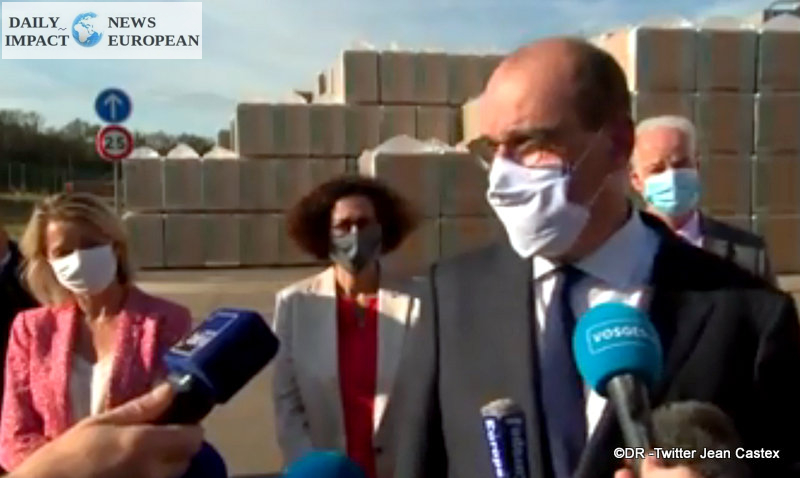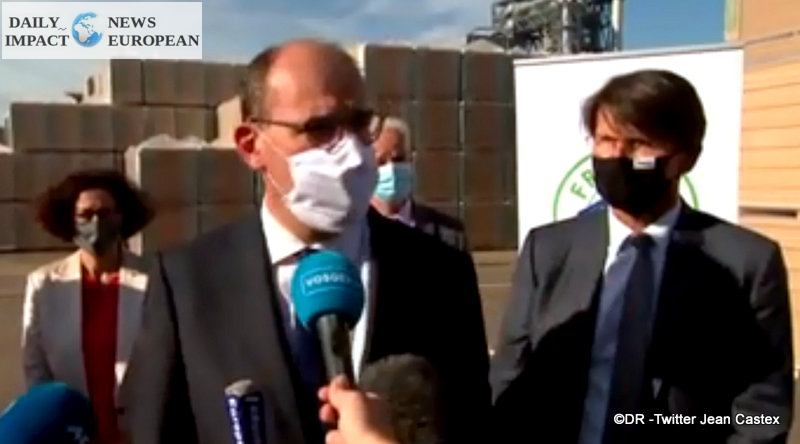Prime Minister Jean Castex presented on Thursday the details of the recovery plan, estimated at 100 billion euros, decided by the government. In this budget, companies are carving out the lion’s share: 35 billion euros are mobilized to boost their competitiveness. 35 billion euros are mobilized for the latter, including 20 billion to lower their production taxes.
The government has been preparing this plan for several weeks, for a total amount of 100 billion euros. The objective is to “find from 2022 a level of national wealth equivalent to the level before the crisis” in the words of the Minister of the Economy Bruno Le Maire. The goal is to create 160,000 jobs by the end of next year, says Prime Minister Jean Castex.
The fight against unemployment is the top priority of the government’s recovery plan, as Prime Minister Jean Castex underlined in his general policy statement in mid-July. This plan, which is to be deployed over two years, is a continuation of the 460 billion euros mobilized as part of the emergency mechanisms put in place since the start of the crisis.
To “prepare France for 2030”, as Jean Castex says, the government therefore prefers to bet on a “supply shock”. It is for this purpose that he is drastically lowering corporate taxes. Production taxes, for example, represent a fifth of the 100 billion euros in the recovery plan.
It is also reserving 7 billion euros in aid over 10 years to develop the hydrogen sector and has made it a priority to help locate future activities in France. Because for Matignon, the only policy that works is one that creates jobs. Companies will thus be entitled to a bonus for hiring a young person. Note that today, an apprentice costs almost nothing to his employer.
The government expects 160,000 job creations in 2021, 240,000 in 2022, with a very ambitious goal: to drop below 10% of unemployed by early 2022.
Among the aid to companies, production taxes will notably drop by 20 billion euros. Three billion will be mobilized to strengthen their own funds.
The digital transition of VSEs and SMEs will be assisted to the tune of 385 million euros. In addition, Bercy mentioned export aid and administrative simplifications.
“We are going to invest heavily in relocations”, also promises Emmanuel Macron. In this stimulus plan, 15 billion euros will be devoted to innovation and relocation, “and in particular one billion euros to allow, on very specific projects, to provide aid from the State which help to relocate, “said the head of state.
Ecology
After announcing that 20 billion euros would be devoted to the ecological transition, the government finally raised the bar to 30 billion, but part of it overlaps with the 40 billion dedicated to industry. 9 billion will be allocated to supporting companies in their energy transition, in particular through research and innovation.
Energy renovation
Almost 7 billion euros are mobilized for the energy renovation of buildings: 4 billion for public buildings (schools, university, etc.) and 2 billion for households via the Maprimerénov ‘premium which will be accessible to all households, without income ceiling, from January 1, 2021.
In return, the Minister of the Economy called on building and construction companies to make posted workers work as little as possible in the coming months and to favor the hiring of young people. “On this depends the success of the recovery,” he insisted.
Transportation
Two other sectors of ecology will be “priority”, according to Bruno Le Maire: transport and energy. Transport will benefit in particular from 11 billion euros, of which 4.7 billion will be allocated to SNCF in order to redevelop rail freight, in particular the Perpignan-Rungis line, small lines and two night train lines. SNCF must be “better managed, more efficient”, asks Jean Castex.
The rest will go to a bicycle plan and public transport.
Agriculture
The development of more sustainable agriculture and healthier food will benefit from aid to the tune of 1.2 billion euros.
“The adaptation of our crops to climate change” will be supported in particular via this recovery plan, said the Minister of Agriculture, Julien Denormandie, at a time when the drought is affecting some of the farmers.
Culture
The recovery plan includes 2 billion euros for culture, seriously affected by the health crisis. In this envelope, 432 million euros will be devoted to live performance, including 220 million for private live performance, 200 for subsidized live performance and 12 million for “employment and author artists”, indicates the Ministry of Culture . To this is added an exceptional program of 30 million “for artistic commission”.
Private
Of the 220 million dedicated to the private sector, 200 will be devoted to “the musical sector as a whole” and “will benefit” “producers, authors, broadcasters” and 10 million will go directly to the CNM (National Music Center) to complete “its ramp-up over two years “.
Finally, 10 million euros will make it possible “to supplement the emergency fund for private theaters and non-contracted companies”.
The public
As far as the 200 million euros from the public sector are concerned, 120 will go to “national public operators”, such as, for example, the Paris Opera or the Comédie Française, 30 million euros will go to “performing arts institutions (theater, dance, street arts and circus) in the region “, 30 million will help” ensembles, orchestras and festivals “and a fund of 20 million will be deployed” to encourage the ecological transition of creative institutions in the region “, details the Ministry of Culture.
The movie theater
Finally, Prime Minister Jean Castex announced on Friday August 28, at the opening of the Francophone film festival in Angoulême, that support for cinematographic creation would be reinforced by the State to the tune of 165 million euros. “These support measures, unprecedented in their scope and ambition, will have a ripple effect on the entire industry, from authors to broadcasters and theater operators,” assured the Prime Minister.
Solidarity and health
About 20 billion euros will be dedicated to measures to support the most disadvantaged and purchasing power. The € 100 increase in the back-to-school allowance, which is part of it, represents around € 500 million. The poverty and anti-exclusion plan will be endowed with an additional 200 million euros.
This envelope also contains the 6 billion euros “additional investment support” in the health system.
35 billion euros are dedicated to social and territorial cohesion, including 15 billion for employment, of which 6.5 billion for youth employment. This envelope includes in particular a hiring aid for young people under 26, of up to 4,000 euros, granted for a contract of at least three months and for a salary not exceeding two minimum wage.
An “anti-unemployment shield” will also be deployed via long-term partial activity (6.6 billion) and increased resources allocated to training, focusing in particular on the sectors of the future (1 billion).
Finally, the government will release 100 million euros as part of a government hiring aid scheme for unemployed people with disabilities, “without age limit”, announced Prime Minister Jean Castex. The aid will be 4,000 euros, for the recruitment of a disabled worker on a contract of at least three months and for a salary not exceeding two minimum wage.
Overseas
The recovery plan will devote 1.5 billion euros to Overseas, indicates the Ministry of Overseas. They will finance social measures, the renovation of water networks and public buildings, agricultural transformation and road infrastructure.
“This 1.5 billion is the basis of what we can identify for the Overseas”, specifies the Ministry of Overseas Territories, but the overseas territories could also “appear in all the national measures of the Recovery plan”.
From “sub-prefects to relaunch” in the territories
“On the ground, everywhere in France, the Prime Minister has taken the decision to install sub-prefects for transformation and recovery”, who will “have to” give us all the administrative blockages, procedures, very complicated devices ” , said the Minister of Transformation and Public Service, Amélie de Montchalin on France 3.
“We will have the impression from Paris to have put 100 billion (euros) on the table” with the government stimulus plan, “but some, perhaps, will tell us, that does not happen at home. It is against that that we must act, explained the minister. These sub-prefects for the recovery and the transformation, their role, it is to tell us what we must unblock and make sure it works. They will take office at the same time as the recovery plan, at the start of 2021. “
“We have selected a number of sectors where we are going to invest heavily so that we relocate or locate current or future activities (…) The objective is to give work to companies and therefore to the French,” said Mr. Castex.




More Stories
METAL D’ALCOVE, the workshop of Eric KATZ, lighting sculptor in Montmartre
Paris Marathon 2024: Victory for Ethiopians at the Paris marathon
Gelsomina